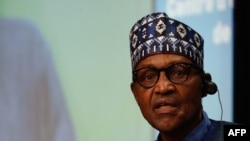Nigeria's government marked World Press Freedom Day by saying it remains committed to freedom of the press and protecting the rights of journalists, but the Nigerian Guild of Editors said the country’s independent press is under attack.
Nigerian President Muhammadu Buhari's statement advocating for press freedom was released by his media aide, Femi Adeshina, ahead of the May 3 World Press Freedom Day commemoration.
In the statement, Buhari said, "We must stay united in supporting media professionals who work hard to de-escalate violent conflict and promote peaceful society without compromising the responsibility to report."
The president urged government information managers to ensure journalists have easy access to government facts and figures. He also urged journalists to be conscious of their coverage ahead of Nigeria's elections next February.
But the president's message is strongly disputed by the Nigerian Guild of Editors, who released a statement Monday accusing authorities of stifling free reporting.
Guild President Mustapha Isa said authorities are being two-faced.
"Just go to any ministry and say you're applying for information," Isa said. "It will take days, even months, without getting that information from them except, 'You have to go to court.' So, it's not a matter of 'the environment is free.' No. But we're determined to do our jobs the way it should be done. We've always stood for truth, even at the risk of our lives."
Press freedom group Reporters Without Borders said most of Africa’s violent attacks and cases of arrests and detention of journalists were in Nigeria. The group also said journalists are often watched, attacked, arbitrarily arrested and even killed.
The guild said authorities greatly interfere with journalists’ right to access and to disseminate information. Omoyele Sowore, an investigative reporter and publisher of the Sahara Reporters website, said his reporting has put him in detention many times.
"I've prepared my mind for the consequences," he said, "so when they come around to arrest or detain me or torture or assault me ... I'm really sad that they'll do all these and then turn around to say that they believe in press freedom.”
Nigerian authorities said their decisions to arrest or detain certain journalists are mostly in the greater interest of the Nigerian state.
Last year, authorities banned Twitter after the company deleted comments from Buhari. Officials accused the company of being biased and allowing possible unrest in Nigeria. Even though authorities lifted the Twitter ban seven months later, the president refrained from using his account until Monday.
"What they see as national interest is actually the government's interest,” Isa said. "So, when we say no, they'll say we're not patriotic."
In March, a court of the West African bloc ECOWAS ordered Nigerian authorities to amend its cybercrime law. Rights groups say the law has been cited too often as a reason for arresting and punishing journalists.




